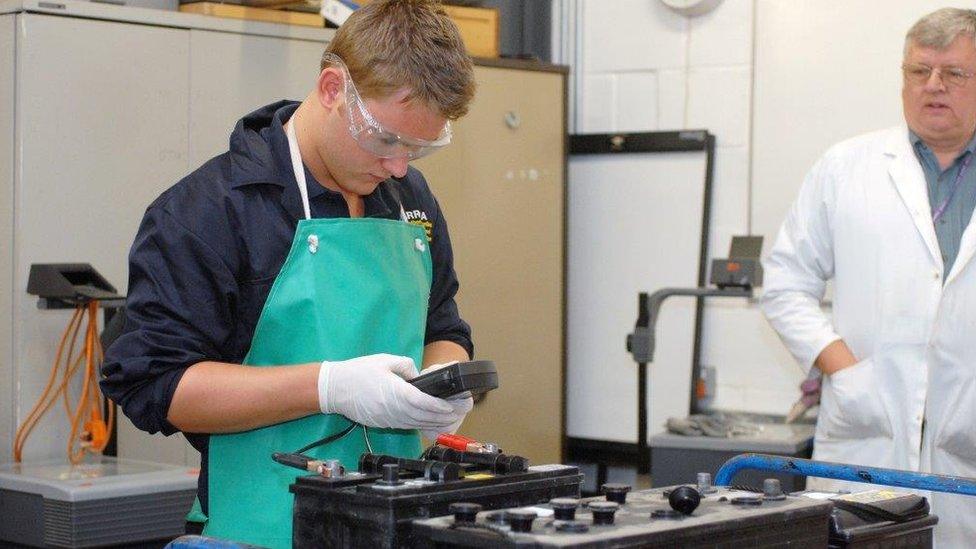Colleges' financial health 'fragile', says audit office
- Published
- comments

The financial sustainability of colleges in England faces "significant challenges" due to funding constraints and uncertainty, auditors. warn.
The National Audit Office (NAO) says while government has spent "significant amounts" on helping individual colleges in financial difficulty, core funding for the sector as a whole has fallen.
The NAO says the sector's financial health "remains fragile".
The government says the sector will get a "£400m boost" in 2020/21.
The auditors' report says a financially sustainable further education sector is "vital to delivering the education and training that the country needs".
"Government expects colleges to play an increasingly prominent role in the coming years - to help meet the need for a more skilled domestic workforce following the UK's exit from the European Union and to support the government's plans to develop national infrastructure, increase the number of public servants, and 'level up' skills and prosperity across the country," it says.
"Colleges will also be important in developing the skills of people who retrain or change roles as a result of the economic impact of the Covid-19 pandemic."
But in its report into the financial sustainability of colleges, the fieldwork for which was done between November 2019 and March 2020, the NAO warns that core funding to colleges has fallen in recent years,
"Department for Education funding per student aged 16 to 19 fell by 7% in real terms between 2013/14 and 2018/19.
"Although the national basic funding rate for learners aged 16 to 17 has remained at £4,000 per student since 2013, in 2014/15, DfE reduced the rate for students aged 18 to £3,300, even though the basic cost of teaching 18-year-olds is likely to be the same as for 16- to 17-year-olds.
"Total funding for adult education and support services (excluding apprenticeships) fell by 35% in real terms over the same period."
1 million adults and
660,000young people under 18 are educated and trained each year in
242 colleges across England
£6.5bnincome in 2018/19
£5.1bnof which was public funding
The NAO says that at February 2020, the government was intervening in nearly half of colleges with the aim of preventing or addressing financial difficulty.
The auditors note that, despite the financial pressures, at August 2019, more than four in five colleges were graded as good or outstanding by Ofsted.
"However, financial constraints have meant that colleges have narrowed their curriculum and reduced broader support for students, such as careers advice and mental health services.
"This is likely to have detrimental effects on students and the development of skills."
The DfE is currently drawing up a 10-year reform programme to address a range of challenges in the FE sector and the NAO recommends this should set out a clear vision for the role, structure and funding of the sector.
Head of the NAO Gareth Davies said: "Colleges play a crucial role in many people's lives and are vital in the development of the skills and knowledge the country needs.
"While there has been some progress in improving financial security in the sector, this has cost a lot of money, and systemic long-term weaknesses remain unresolved."

A spokeswoman for the DfE said; "We've already acted to stabilise the sector and to support colleges by guaranteeing grant payments, introducing greater flexibilities so students can continue studying, and provided extra investment through our 16-19 bursary fund."
She said colleges would also benefit from a "£400m boost" in 2020/21 and a forthcoming white paper would "strengthen our colleges further".
'Cinderella service'
David Hughes, head of the Association of Colleges, said the report showed colleges had done a "remarkable job to cope with real terms cuts while focusing on the quality of the student experience".
"The cuts have hit colleges hard, but even more importantly, they have resulted in the most disadvantaged students in our society bearing the brunt of austerity."
Colleges needed a stable, long term and fair funding settlement, he added.
Geoff Barton, head of the school and college leaders union ASCL, said the government had treated the sector "as a Cinderella service".
"This report tells us what we already know only too well - that the government has failed colleges and their students through years of underfunding."